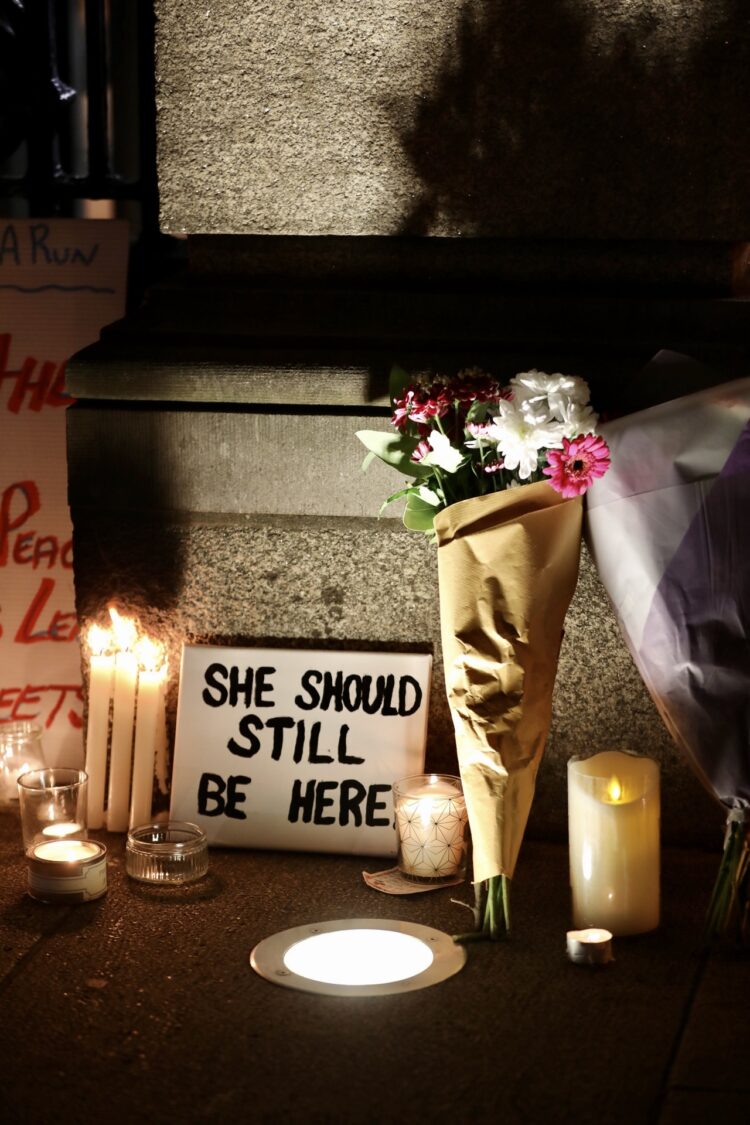Politicians and members of the public paying their respects at the vigil for Ashling Murphy outside the Dáil, expressed their sadness and anger, and called for change

Hundreds gathered outside the Dáil, and at similar vigils around the country to remember Ashling Murphy, and to call for an end to male violence against women.
Speaking to the crowd standing in front of the Dáil gates, carrying flowers, candles and signs, National Women’s Council Director Orla O’Connor led the emotional tribute to Ashling, the wonderful woman she was, and also called for change at every level.
“‘It absolutely has to be a watershed moment because we can’t have a situation where women do not feel safe and where women are limiting their movement all the time for fear of violence and that needs to end.
“Enough is enough. We live in a society where male violence or the threat of male violence impacts and affects the decisions that we make as women everyday,” she said.
She called on everyone gathered to call out everyday sexism.
“We want to see men challenged by each other and ourselves — we need to start to challenge the small things that lead to the big things. When a sexist joke or derogatory comment is made, we need to start to challenge those things.”
Activist Ailbhe Smyth spoke of the bitter sadness felt by everyone at the gathering.
“What can you do but cry at the loss of any woman, because of wickedness, because of cruelty, because of an exercise of power,” she said.
“We’re going to make sure that in our education system, in our culture, in every part of this country, zero tolerance will happen.”
The time is now

Amongst the crowd gathered to watch the speeches, as well as memories shared by Ashling’s friend Grace and performances from musicians who knew her, were the Taoiseach Micheál Martin, Sinn Féin leader Mary Lou McDonald and former Lord Mayor and Green Party Councillor Hazel Chu.
“It’s a huge gathering and it is very moving to see this level of respect paid to Ashling. Everyone’s hearts are broken for her family and friends. It is horrific,” Ms McDonald said.
“I grew up at a time where I remember women disappearing, being injured, or being killed, and the fear that we had as a generation. I have now raised my own daughter, it is decades later, but it’s still the same story.
“This has to be a tipping point. We have to firstly pay our respects to Ashling and her family, and tears will be shed, but tears aren’t enough either. This has to be a moment of enough is enough.”
Hazel Chu echoed the call for change.
“It’s incredible how everyone is affected in some way by this, but at the same time, it’s the worst thing to have gathered for. We haven’t seen this mood or these numbers since Savita,” Ms Chu said.
“We have been saying this since 2007, since Manuela Riedo, that we need to look at, from a very young age, how we look at consent, how we look at misogyny, but nothing has been done since then. So the question is now to my own party and every other party, what are we going to do about it?”
Emotions and fear

People started arriving to Kildare street to leave flowers and light candles from 3pm. By the time the vigil started at 4pm, the streets were crowded in every direction.
A young woman, Veronica Pittman, arrived early with a bouquet of flowers and was visibly emotional as she spoke.
“We’ve all been in a situation where we felt scared, and for this to happen in broad daylight is really scary. The news made me feel totally shaken up, like most of us have been, this makes you relive all the similar experiences we’ve all had. I think we can all empathise,” she said.
“I hope this changes the way we talk about violence, and that it changes the way men approach situations. Men need to acknowledge the role they have to play in women’s rights and the gender-based violence that occurs, not just in far off places but here at home as well.”
Ciara Farrell attended the vigil with five friends.
“We’re here to show solidarity. It could have affected any of us. It’s a real problem that girls have to think of everyday. It’s a conscious programming in your brain of decisions that you make regarding your safety, and the fear that it could be one of us.”
Emily Rogers believes Irish women could easily imagine themselves in Ashling’s shoes.
“We never walk home alone, even from the library. If one of us is staying late, another will stay with them. It’s not taking shortcuts, taking the main road to walk places, and choosing well-lit places. I’m sure Ashling herself even decided to go on her run before it went dark, and to go to a populated place.”
Standing alone, a woman who asked only to be referred to as Bríd, was solemn as she said, “I am just sad.”
“I am heartbroken for the family — and I hope this makes people realise that we are still living in the dark ages.”
Also standing alone with flowers in her hand, Amy Larkin works at a nearby hospital, and felt moved to pay her respects. It has been a difficult few weeks.
“I wouldn’t usually come to something like this, but it is so shocking, I just had to come and do something. It is horrible, and really relatable, as what happened to her could happen to any of us, or our mother, our sisters or our friends,” Amy says.
“I just hope her family knows that the country won’t rest until that person is found, and something is actually done about it. It shouldn’t be the case that something like this has to happen for us to see change. What happened to 17-year-old Alanna Quinn Idris in Ballyfermot, that is just up from my house, and the fact that they got out with a bail of €200 is not good enough. I just feel such anger and sadness.”
Necessary conversations

Megan Ní Ghabhláim held her infant daughter in her arms, while her other daughter, just a toddler, watched the crowd from her pram. When asked to speak, this was clearly an issue that weighed heavily on her mind as she worried for her daughters in future.
“Right now, I can keep my carefree daughters under my watchful gaze, I can protect them. From a mother’s point of view, the idea that just because of my daughters’ gender, I am going to have to teach them how to protect themselves throughout their lives. Because of the society we live in, and the misogyny and sexism that goes unchallenged each day, it perpetuates that gender-based violence is somehow acceptable,” Megan says.
“I hope the family know how much we are all thinking of them. This was such a needless act, that is going to leave them lying awake and wondering why, why their daughter? Something has to change. This is everyone’s issue, it’s not just a women’s issue.”
Paul Donnelly felt moved to attend the vigil because of the sheer shock of what happened to Ashling.
“It really stopped everybody in their tracks, the randomness of it, but then also the outpouring from women of the experiences they’ve had on a daily basis. This feels like an awakening, that we have to talk to our brothers, our fathers and our sons about the way we engage with and talk to women. We have to listen to what women are saying, there hasn’t been enough of that,” he says.
“Some men are very quick to jump to the defence of “not all men”, but there are enough men out there engaging in behaviour or sitting in silence in the pub while certain jokes or comments are made. Even when we’re uncomfortable, we have to speak up and say it’s not okay. All men have a huge responsibility now to say enough is enough.”
Photography: Claire Nash | Words: Saoirse Hanley and Róisín Healy








